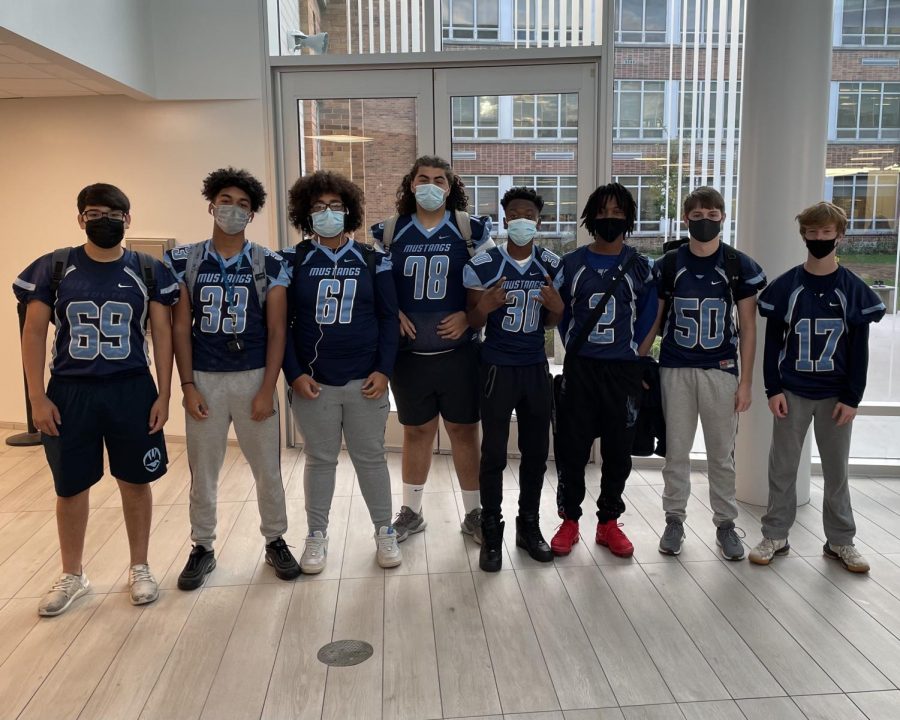DGS athletes & mental health: Battling on and off the playing grounds
DGS football’s “Guardians” offer guidance to younger players and take them under their wings.
October 29, 2021
Mental health struggles related to participation in sports are not uncommon; as a result, DGS athletes and coaches are seeking ways to combat the mental challenges that come with being a high school student-athlete.
DGS senior Bella Lapacek, an avid member of the cross country, basketball and softball teams, is no stranger to stress and time management.
“I do face a lot of challenges,” Lapacek said. “There are some ups and downs with time management and stress levels, but overall sports are a way of releasing the stress and just being around people who enjoy the same things as you and it overall just makes me happy playing the sport or participating in the sport.”
Along with conquering her own endeavors, Lapacek uses her experience to hone in on supporting her teammates who might be going through their own battles.
“I make sure that I check up on [my teammates], like if I notice they’re kind of having an off day or if they’re not doing well in a practice or a game, I go up to them and make sure that I figure out what’s going on with them [or] if they need to talk,” Lapacek said. “Whatever they need I just want to make sure I’m there for them.”
As a coach for DGS football and baseball, Matthew Quatman is dedicated to developing healthy communication skills between him and his athletes if they need somewhere to turn to in case they are struggling.
“If students are having some anxiety with school or [a relationship] or something and they don’t let me know that, that’s shame on me as a coach for not having those clear lines drawn, and not having that open-minded communication obvious enough for the student,” Quatman said.
In an interview with The Atlantic, Marshall Mintz, a New Jersey–based sports psychologist who has worked with teenagers for 30 years, explained how mental health struggles in teenage athletes have reached a greater extent in the past several years.
“The professional consensus is that the incidence of anxiety and depression among scholastic athletes has increased over the past 10 to 15 years,” Mintz said.
With his own experiences as a former high school and college athlete in mind, Quatman is passionate about making sure that his athletes are supported in their current endeavors as well as in what lies ahead of them.
“Honestly I want to make sure that they’re in the right headspace, and when I mean that, I want to make sure that they not only are going to make it through the game mentally but have a full and fulfilling life in terms of full brain functionality,” Quatman said.
Several unique methods of handling mental struggles can be seen throughout the sports community at DGS. Senior Olivia Bifulco, another multi-sport athlete involved in tennis, basketball and softball, works to make sure her priorities with school and sports are straight so that she can effectively focus on her needs.
“I make sure to, obviously they tell you to, put school first because it is [called] a ‘student-athlete,’ so I make sure all my work’s done and if I ever think there’s a conflict I just talk to my coaches about it,” Bifulco said.
Quatman touches on “Guardians,” a fully-fledged out support system that has been implemented for younger or new football players.
“For football we have this thing called Guardians which are the seniors and a couple juniors who have been through the program and seen what it’s like, and they are there to kind of lead [juniors, sophomores and freshmen]… and just help them with anything,” Quatman said. “[It’s about being] somebody that they can always turn to.”
While some can only remain hopeful that the discussion surrounding athletes’ mental health becomes more prominent, DGS coaches and athletes themselves are working to grow support within the school’s sports community that could potentially reach great lengths.
For information about national support systems for athlete mental health, visit aaadf.org.




